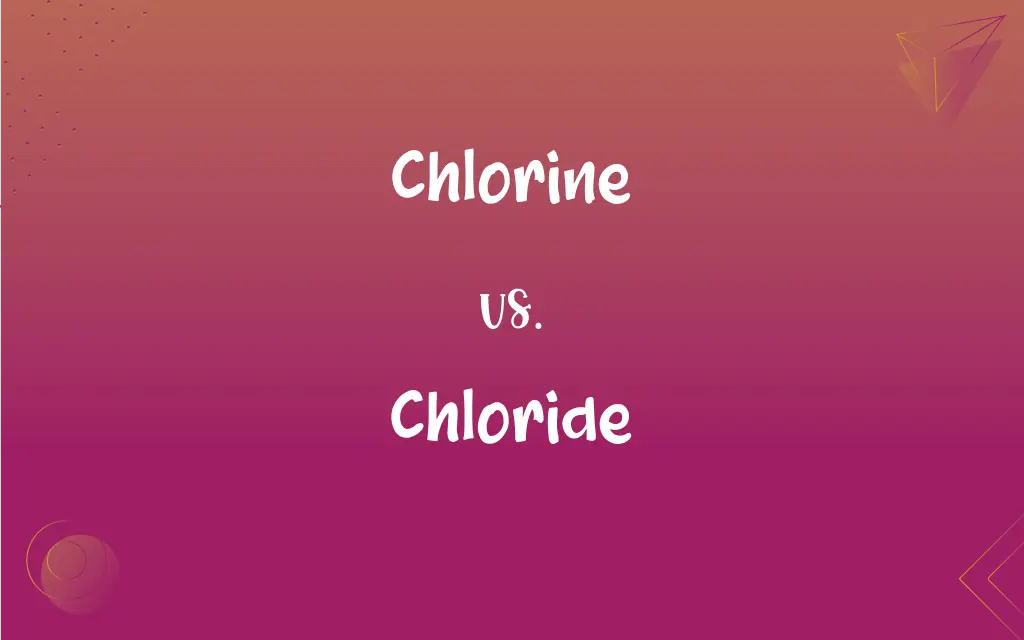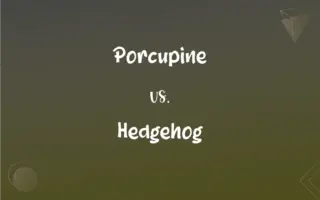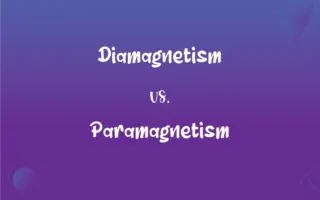Chlorine vs. Chloride: What's the Difference?
Edited by Aimie Carlson || By Harlon Moss || Updated on October 15, 2023
Chlorine is a yellow-green gas and chemical element, while chloride is its negatively charged ion.

Key Differences
Chlorine is a chemical element represented by the symbol "Cl" and has an atomic number of 17. It is found primarily as a yellow-green gas at room temperature. Chloride, on the other hand, refers to the anion (negatively charged ion) form of chlorine, often encountered as a salt like sodium chloride (table salt).
Chlorine is widely used as a disinfectant, especially in water purification processes. When it reacts with water, it forms hydrochloric acid and hypochlorous acid, both of which are effective in killing bacteria. Chloride ions are prevalent in nature and are essential components of bodily fluids like blood and extracellular fluid.
Chlorine is also a part of many industrial processes and is used in the production of a wide range of consumer products. Chloride, conversely, is often discussed in the context of its presence in our diet, as it forms part of table salt, which is sodium chloride.
Inhalation of chlorine gas can be harmful as it can form hydrochloric acid in the lungs and cause respiratory distress. Chloride, being an ion, doesn't have such harmful properties on its own but can be a concern when present in excessive amounts in the body.
Comparison Chart
Nature
Chemical element
Anion (negatively charged ion)
ADVERTISEMENT
Symbol
Cl
Cl⁻
Common Compound
Chlorine gas
Sodium chloride (table salt)
Uses
Disinfectant, in chemical production
Essential component in bodily fluids
Hazards
Can be harmful when inhaled
Concern when present in excessive amounts
Chlorine and Chloride Definitions
Chlorine
A yellow-green gaseous chemical element used primarily as a disinfectant.
The swimming pool smells like chlorine after being cleaned.
ADVERTISEMENT
Chloride
An ion that pairs with cations to form various compounds.
Calcium chloride is used as a de-icing agent on roads.
Chlorine
A halogen with the atomic number 17 and symbol Cl.
Chlorine is one of the elements found in the periodic table.
Chloride
A component of many salts, including sodium chloride and potassium chloride.
Most table salts are primarily made up of sodium and chloride.
Chlorine
A common component in industrial processes for producing various products.
The paper industry utilizes chlorine for bleaching purposes.
Chloride
An essential ion present in bodily fluids.
Chloride levels in the blood can indicate certain medical conditions.
Chlorine
A gas with a strong, pungent odor, often associated with swimming pools.
The strong smell of chlorine reminded her of summers at the local pool.
Chloride
The negatively charged ionic form of chlorine.
Sodium binds with chloride to form table salt.
Chlorine
A substance that, when combined with water, produces acids that kill bacteria.
Chlorine reacts with water to form disinfecting agents.
Chloride
A term often related to discussions on dietary intake due to its presence in salt.
Doctors often advise monitoring sodium and chloride intake for hypertensive patients.
Chlorine
A highly irritating, greenish-yellow halogen element, existing as a diatomic gas, Cl2, and capable of combining with nearly all other elements, produced principally by electrolysis of sodium chloride and used widely to disinfect water, as a bleaching agent, and in the manufacture of many important compounds including chlorates, sodium hypochlorite, and chloroform. Atomic number 17; atomic weight 35.453; freezing point -100.5°C; boiling point -34.04°C; specific gravity 1.56 (-33.6°C); valence 1, 3, 5, 7. See Periodic Table.
Chloride
Univalent anionic chlorine, or a compound of chlorine, especially a binary compound of chlorine with a more electropositive element.
Chlorine
A toxic, green, gaseous chemical element (symbol Cl) with an atomic number of 17.
Chloride
(chemistry) any salt of hydrochloric acid, such as sodium chloride, or any binary compound of chlorine and another element or radical
Chlorine
(countable) A single atom of this element.
Chloride
A binary compound of chlorine with another element or radical; as, chloride of sodium (common salt).
Chloride
Any compound containing a chlorine atom
Chloride
Any salt of hydrochloric acid (containing the chloride ion)
FAQs
Is chlorine naturally occurring?
Yes, chlorine is a naturally occurring element, but it is often found combined with other elements in nature.
Where can chloride ions be commonly found?
Chloride ions are commonly found in salts like sodium chloride (table salt).
How does chlorine react with organic materials?
Chlorine can react with organic materials to form harmful compounds like trihalomethanes.
What is chlorine?
Chlorine is a yellow-green gaseous chemical element.
Can inhaling chlorine gas be harmful?
Yes, inhaling chlorine gas can form hydrochloric acid in the lungs and can be harmful.
Why is chloride important in our diet?
Chloride, as part of salt, helps maintain fluid balance and is essential for nerve and muscle function.
Is chlorine used in the production of certain consumer goods?
Yes, chlorine is used in many industrial processes and the production of various consumer products.
Is chlorine flammable?
No, chlorine itself is not flammable, but it can support combustion.
Are there health concerns related to chlorine in drinking water?
While chlorine effectively disinfects water, long-term exposure to its byproducts may have health implications.
What is chloride?
Chloride is the negatively charged ionic form of chlorine.
Are chloride ions essential to the human body?
Yes, chloride ions are essential components of human bodily fluids.
Is chloride related to chlorate or perchlorate?
While all contain chlorine, they differ in their oxygen content and properties.
How is chlorine commonly used?
Chlorine is primarily used as a disinfectant, especially in water purification.
What role does chloride play in the nervous system?
Chloride helps regulate the electrical charges of cells, which is essential for nerve impulse transmission.
Can excessive chloride consumption be harmful?
Yes, excessive intake can lead to high blood pressure and other health issues.
How does chloride enter our body?
We primarily intake chloride through our diet, especially from salt.
Are there any alternatives to chlorine for water disinfection?
Yes, alternatives include ozone, UV radiation, and chloramine.
Is chloride found in the ocean?
Yes, chloride ions make up a significant part of the salt content in seawater.
How is chloride related to sodium in our diet?
Chloride forms part of table salt, which is sodium chloride.
How can one detect the presence of chlorine?
Chlorine has a distinct, strong odor often associated with swimming pools.
About Author
Written by
Harlon MossHarlon is a seasoned quality moderator and accomplished content writer for Difference Wiki. An alumnus of the prestigious University of California, he earned his degree in Computer Science. Leveraging his academic background, Harlon brings a meticulous and informed perspective to his work, ensuring content accuracy and excellence.
Edited by
Aimie CarlsonAimie Carlson, holding a master's degree in English literature, is a fervent English language enthusiast. She lends her writing talents to Difference Wiki, a prominent website that specializes in comparisons, offering readers insightful analyses that both captivate and inform.






























































